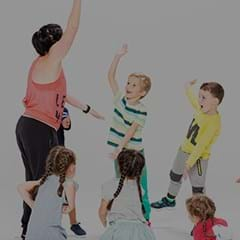Early morning practices, orange slicing, uniform washing, and hours of cheering from the sideline. Many parents consider supporting children to play sport as just another part of the parenting job description. After all, using sport to build fitness and team skills is the secret to healthy children, isn’t it?
With an estimated 21.5 million American kids currently playing team sports, there’s no doubt it’s a great way to get the masses moving. Research shows 60 percent of these boys and 47 percent of the girls are already on teams by age six1. But sport is not right for everyone. In fact, in some cases it can do more harm than good.
Janine Phillips, BORN TO MOVE Creative Director, understands first-hand how sport is great for some children (her two teenagers have successfully competed at a national level in various sports). But she also knows sport can be detrimental.
“Sport is great for those who are fast, fit, co-ordinated and competitive.” However, for every child who loves their sport, there are those who don’t have a natural affinity. “Unfortunately, these kids often develop the belief that they are no good at sport and do not have the confidence to try other activities. This can lead to a lifetime of inactivity.”
Even if a child latches on to sport early, there’s a good chance it won’t last long. With a limited number of children getting chosen for sports teams and pricey memberships and uniform costs, even the most enthusiastic children can be forced to miss out. The older children get, the more likely they are to drop out because there is too much pressure, it takes too much time and, most significantly, because they are not having fun2.
In many situations the lack of fun is born from sporting environments where the focus is solely on winning – and enjoyment is out the window. This is compounded by demanding practice schedules and costly memberships that mean children are increasingly forced to ‘specialize’ in a specific sport. As a result they don’t get the opportunity to try different activities and work out what they really enjoy. What’s more, in most situations when children specialize, it doesn’t enhance the opportunity for long-term athletic success – in fact it may increase the risk for overuse injury and burnout3.
And the injury risk is very real. In 2013 in the United States there were 1.24 million children seen in emergency rooms for sports-related injuries4. More than half of these injured youngsters continued to play in the game because they didn’t want to let their coach down or were afraid they would be benched.
Such pressure on young people seems absurd. After all, the likelihood a child transitioning their high school basketball talents into the NBA is slim. Statistics show that just one in 10,000 teenage players will make it to the NBA, one in 6000 will make it to the NFL, one in 4000 will make it to the MLB5.
Janine suggests that parents wanting to set their child up for a lifetime of physical activity and fitness think outside the box, and focus on enjoyment. “All children want to move, the secret is to find a range of activities they enjoy, where they feel they can confidently give it a go and learn good skills that they can develop over their lives.”
Giving children a sporting chance comes down to providing opportunities to get moving in a safe and fun environment. “If they enjoy learning basic movement patterns that will gain confidence, skills, coordination and most importantly self-efficacy,” says Janine, who believes that empowering children to believe they can be successful at accomplishing new activities is one of the greatest gifts we can give them.
Les Mills BORN TO MOVE™ is designed to help children fall in love with physical activity. Classes feature a range of basic foundation movement patterns set to age-appropriate music. Children develop coordination, agility, fitness and confidence but also learn to encourage others and work as a team. They learn that physical activity requires commitment and determination but also feels good too. Learn more about BORN TO MOVE here.








